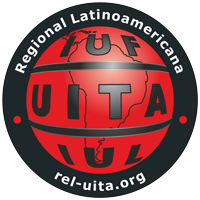Brazil | MEATPACKING | INDIGENOUS PEOPLES
With Fernanda Kaingáng
The revision of the NR36 and how it affects indigenous communities directly
In 2020, some ten to twenty thousand indigenous workers were employed in Brazil’s meatpacking plants. The NR36, a norm that regulates health and safety conditions in that industry, cannot be modified without first consulting the indigenous communities that will be affected by any proposed changes. However, indigenous activist and lawyer Fernanda Kaingáng told La Rel that this revision was presented out of the blue, without prior discussion, thus violating the obligation to consult the indigenous peoples concerned, as stipulated by ILO Convention 169.
Amalia Antúnez

Foto: Gerardo Iglesias
-How would indigenous communities be affected if the norm that regulates health and safety conditions in meatpacking plants were to be flexibilized?
-If the NR36 is weakened, it would be greatly detrimental to indigenous workers who turn to meatpacking plants and other large industries for employment.
And it is not just the workers. We need to also to consider that those who work in meatpacking plants do so to provide for their families, which are usually very large.
The indigenous population is already economically vulnerable. Federal government figures show that indigenous communities have signed up en masse for food assistance programs such as the “Bolsa Familia” scheme.
So a revision that eliminates the psycho-physiological recovery breaks established in the standard will undoubtedly be an enormous setback that will affect many economically vulnerable workers, as is the case of indigenous workers.
-Are the issues of land access and the leasing of indigenous territories for agribusiness a factor in native communities becoming a source of cheap labor for meatpacking plants?
-It’s all directly connected. Most indigenous workers subject themselves to long commutes, traveling three hours to work and three hours back, in precarious transportation, to earn very low wages, precisely because they have little land.
And what little land they have is being harvested illegally and with no controls, through the leasing of these territories in the name of financial interests for single crop plantations, generally GMOs, which is something that is banned in indigenous reservations.
These single crops contaminate the environment, compromise native varieties and the development of traditional subsistence agriculture, and undermine the very social organization of indigenous people, because they co-opt leaders, getting them to oppress their own communities.
Many indigenous people are thus forced to look outside their villages for their livelihoods. Because of its proximity, especially in the mid-west and south regions, the meatpacking industry absorbs this labor force, which ends up exploited and abused in the plants.
-This situation you describe has worsened in recent years, especially with the government of Jair Bolsonaro…
-While this is not new, under the current government it has gotten considerably worse. Previous governments implemented a number of measures, including income distribution mechanisms, sustainability projects, land demarcation, etc.
All of that was lost with this government, and there has been a steep rise in land rights violations.
When indigenous lands are not delimited and, on top of that, mining, logging, and agribusiness interests are favored, as this government has done, the situation of indigenous people is one of complete vulnerability.
The pandemic made everything worse, because the communities were isolated due to the very high rate of infection among indigenous workers in the meatpacking plants, which also had the highest mortality rate due to the genetic conditions of the native populations.
-How does the NR36 revision violate ILO Convention 169?
-This Convention is the strongest international instrument concerning the defense of the rights of indigenous peoples, especially in the field of work.
Convention 169 establishes the right of indigenous people to be consulted prior to the development of laws or administrative mechanisms that may potentially affect their communities.
Consultations must, in turn, be conducted in good faith, taking linguistic diversity into account, and governments must observe the outcome of the consultation.
This revision of the NR36, done furtively over the end-of-the-year break, violates the right of indigenous people to be informed clearly and in advance about how this measure may affect them.
This regulation’s revision would, in short, entail a step backwards for indigenous people.
Consequently, the Brazilian government must be pressured into observing the internationally recognized rights of its native peoples.
